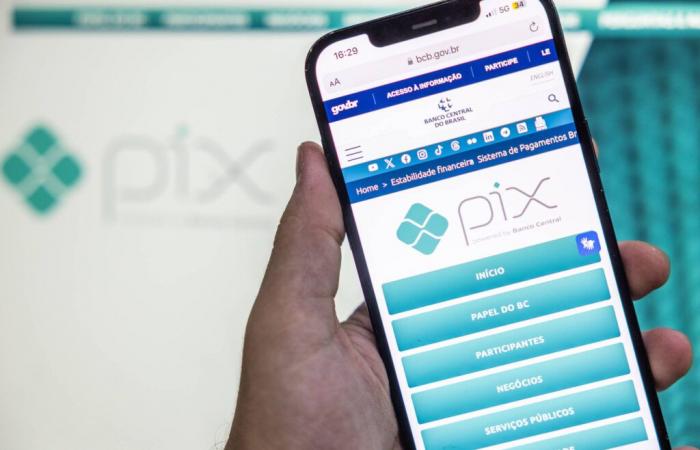The federal government revoked the rule that updated the Federal Revenue Service's monitoring services on financial transactions this Wednesday (15). The retreat occurred after social networks were taken over by a wave of distorted and misleading information – including that Pix would be taxed.
As a result, the rules in force will come into effect again until the end of 2024.
“We are going to revoke the IRS act that changed values for monitoring financial movements. Unscrupulous people distorted and manipulated the Federal Revenue normative act, harming millions of people, causing panic especially among the humblest population,” said Robinson Barreirinhas, secretary responsible for the Tax Authority.
The Tax Authorities have been monitoring transactions for more than 20 years. The reporting of financial institutions to the Federal Revenue was established in 2001, through a complementary law that provides for banking secrecy. Since then, updates have been made to the service to improve “risk management by the tax administration”, according to the agency.
WHAT WAS THE STANDARD THAT UPDATE TAX MONITORING LIKE?
Until it was suspended, the Tax Authority's update expanded the monitoring service for financial transactions. Previously, the administrative body was notified by traditional banks if TED and credit card transactions totaled R$2,000 per month, for individuals, and R$6,000, for companies.
The values had risen to R$5,000 and R$15 thousand, respectively, and the standard included new members of the financial system in the report – notably Pix, among the means of transaction, and fintechs and digital banks, among the institutions.
In practice, nothing would change for the taxpayer. The rule would even reduce the number of transactions reported to the Tax Authorities, as the value rules had increased.
“The rule resulted from an agreement between the Revenue, banks, which have been reporting since 2015, and payment methods, which were included in the rule, and will actually reduce the amount of low-income data available to make the system more rational” , said the Minister of Finance, Fernando Haddad, before the measure was revoked.
WHY WOULD THE RULE IMPROVE SUPERVISION OF MAJOR EVADERS?
By raising the value rule, the rule would reduce the amount of data reported to the Federal Revenue Service and allow suspicious movements to be identified more easily.
“Those who need the attention of the IRS are those who use these new payment methods to hide illicit money, sometimes resulting from criminal activity, money laundering. The focus of the IRS is on them. It is not for you, worker, small business owner “, said the Secretary of the Federal Revenue, Robinson Barreirinhas.
According to him, even in cases of unusual transactions, such as lending a credit card to a family member, there is no risk of being fined by the IRS as this is a common practice among Brazilians. “Just because you spent a little more in a given month doesn't mean that this will cause a problem with the IRS,” he highlights.
Suspicious movements would be identified through data crossing. Based on the information that the Tax Authorities already have about taxpayers – such as Income Tax declarations, bank details, notary records, among others –, it would be possible to identify inconsistencies between what is declared and what is actually transacted.
For example: a person declares that he receives R$5,000 a month and starts depositing R$100,000 into his bank account regularly. By crossing taxpayer data, the IRS could summon him to provide explanations, as the movement could be an indication of money laundering or other illicit activity.
WHY DID THE GOVERNMENT REVOK THE UPDATE?
The rule was revoked because of the strong negative repercussion on social media about the measure, both due to misinformation about false Pix taxation and the opposition's discourse that the federal government was a management that likes taxes and taxation.
The topic was also debated in the political world, and opposition to the Luiz Inácio Lula da Silva (PT) government gained ground in the digital environment.
In recent days, videos and publications critical of the government regarding the Pix measure have gone viral.
The main one is that of deputy Nikolas Ferreira (PL-MG), in which he states that the government “is only thinking about collecting money, without offering you anything” and talks about “breach of secrecy masquerading as transparency”. The video has more than 300 million views on Instagram.
-“The damage caused is done by these unscrupulous people, including senators and deputies, acting against the State. These people will have to answer for what they did, but we do not want to contaminate the MP's progress in Congress,” said Haddad.
Inside and outside the Palácio do Planalto, the assessment is that the government suffered a defeat to the opposition, after a succession of mistakes. Among the points criticized is the fact that a measure of this magnitude received bureaucratic treatment from the economic team, without defining a communication strategy.
WHAT IS WORTH NOW?
With the revocation, the previous rules come back into force. The monitoring will be on transactions that, in the month, total more than R$2,000 for individuals and R$6,000 for companies.
Only traditional banks are still obliged to pass on the data to the IRS, but fintechs and digital institutions, such as Nubank, can send the information voluntarily.
Reporting to the Tax Authorities does not distinguish between payment method. In other words, any transactions that meet the standard will be passed on.
Folha Mercado
Receive in your email the most important things happening in the economy; open to non-subscribers.
WHAT CHANGES FOR PIX?
Nothing changes for Pix, which remains free.
The MP published by the government this Thursday “provides for measures to expand and guarantee the effectiveness of secrecy and the non-incidence of a higher price, value or additional charge on payments made through a Pix arrangement established by the Central Bank”, says the text .
According to the former secretary of the Federal Revenue, Marcos Cintra, Pix was already indirectly monitored by the Revenue even before the standard was updated.
“Banks are required to report transactions above R$2,000 for individuals and R$6,000 for companies, regardless of the payment method. Not all Pix is monitored: it is only those that meet these stipulated values”, says Cintra.
WHY DOES THE REVENUE SUPERVISE FINANCIAL TRANSACTIONS?
The IRS has been monitoring financial transactions for more than 20 years as part of the effort to identify criminals and tax evaders.
“The IRS has no interest in knowing the details, how many Pix you received and who passed it to you, where you spent the money. None of this is reported”, says Barreirinhas.
Financial institutions only transfer the consolidated values of operations. In other words, the nature, origin or type of each transaction are not identified, only the amount moved monthly by each taxpayer.
The data is entered into a computer system known as SPED (Public Digital Bookkeeping System), which has existed since 2007. Bank secrecy, regulated by Complementary Law 105/2001, is not violated, as the Revenue does not have access to the details of the transactions.
Bank secrecy can be broken in specific cases, as detailed in the Complementary Law, but this can only occur through court decisions.






